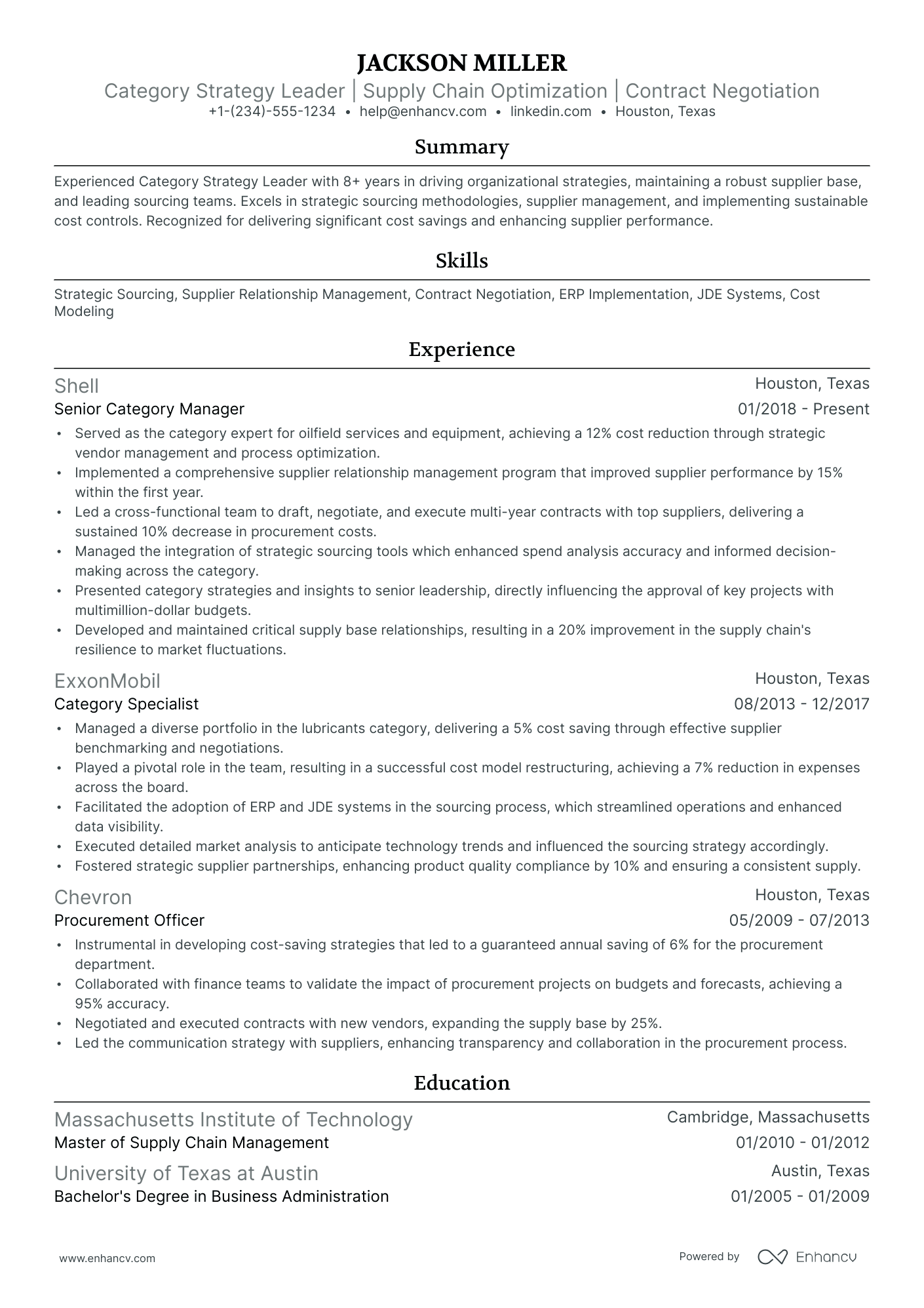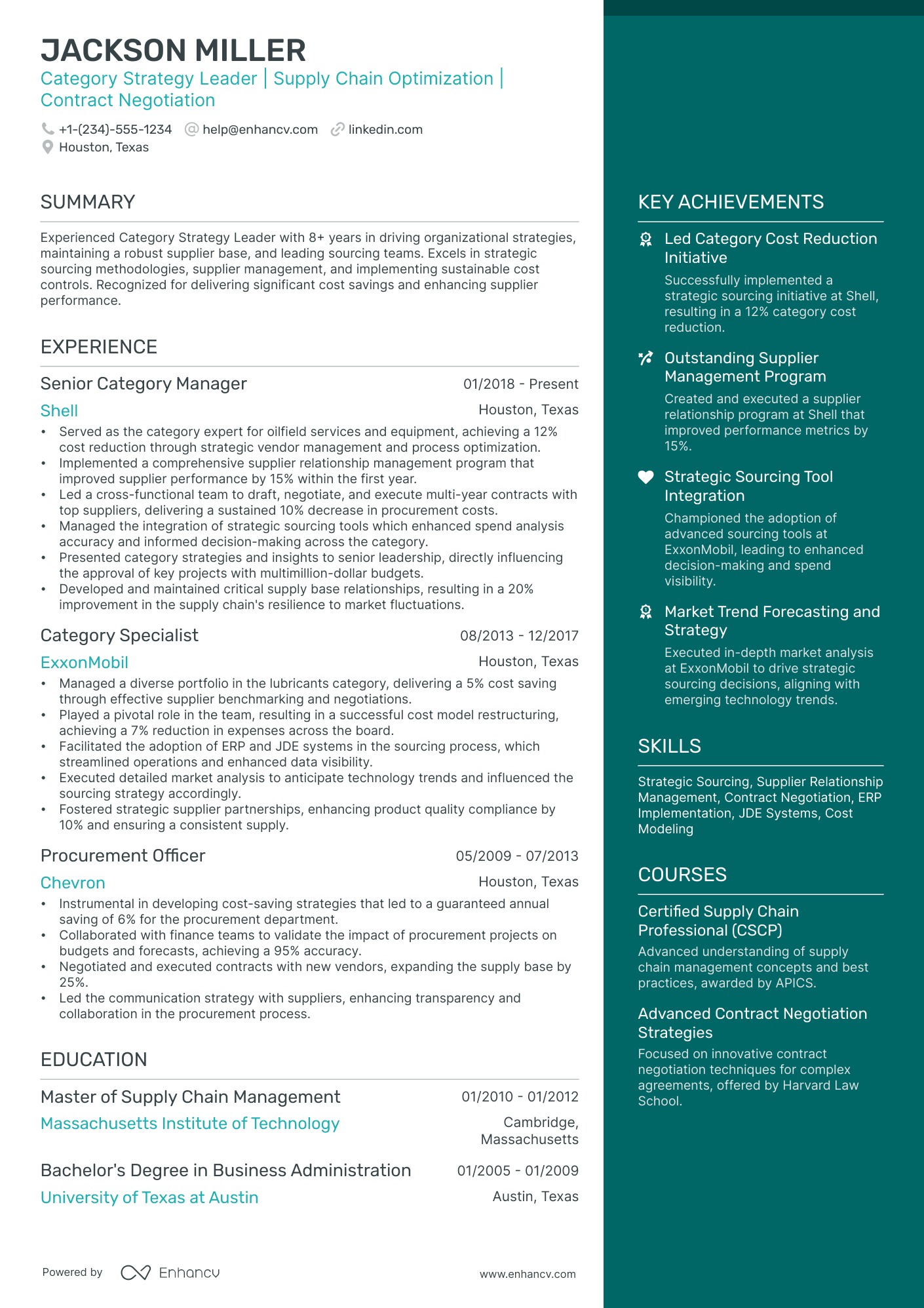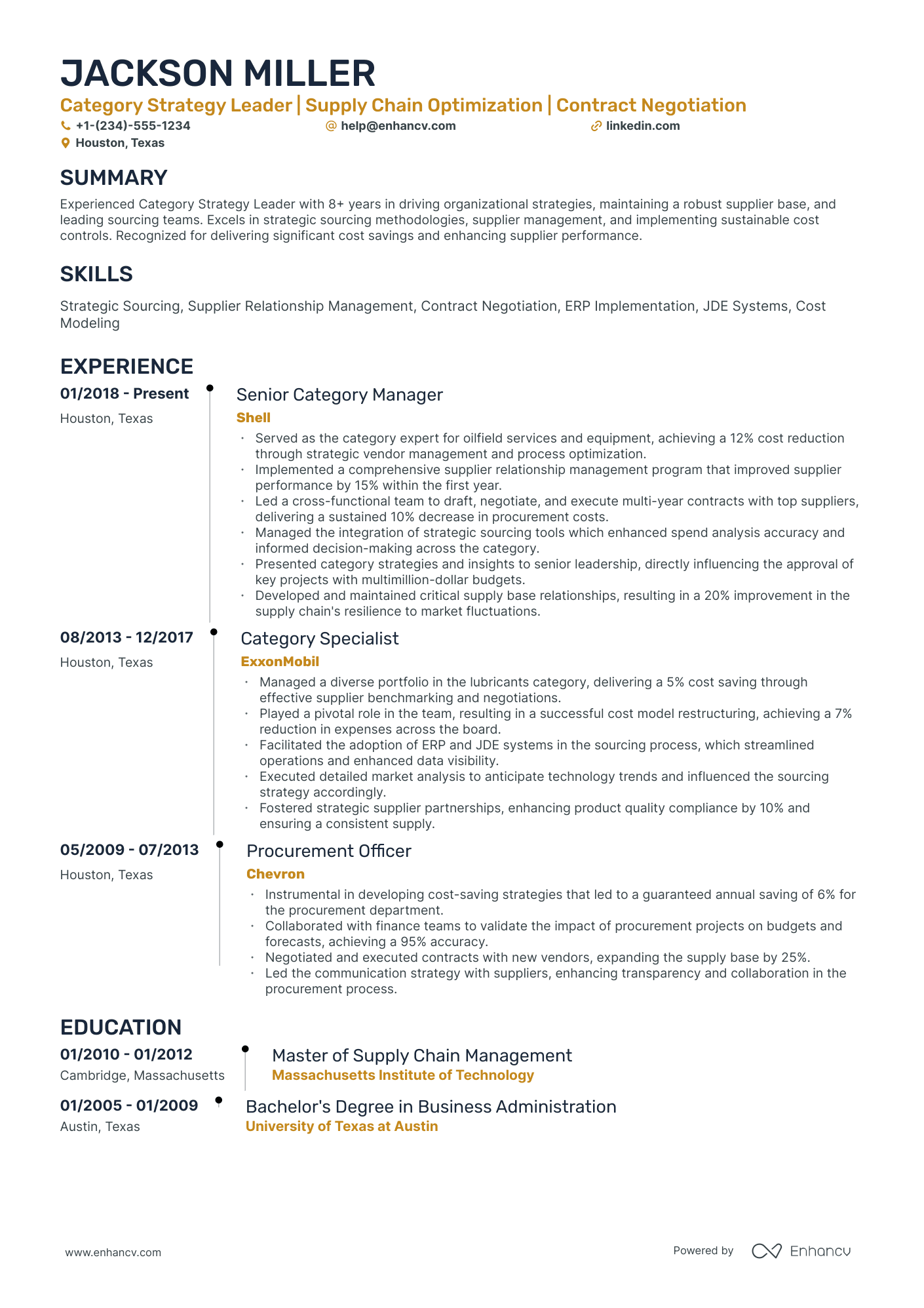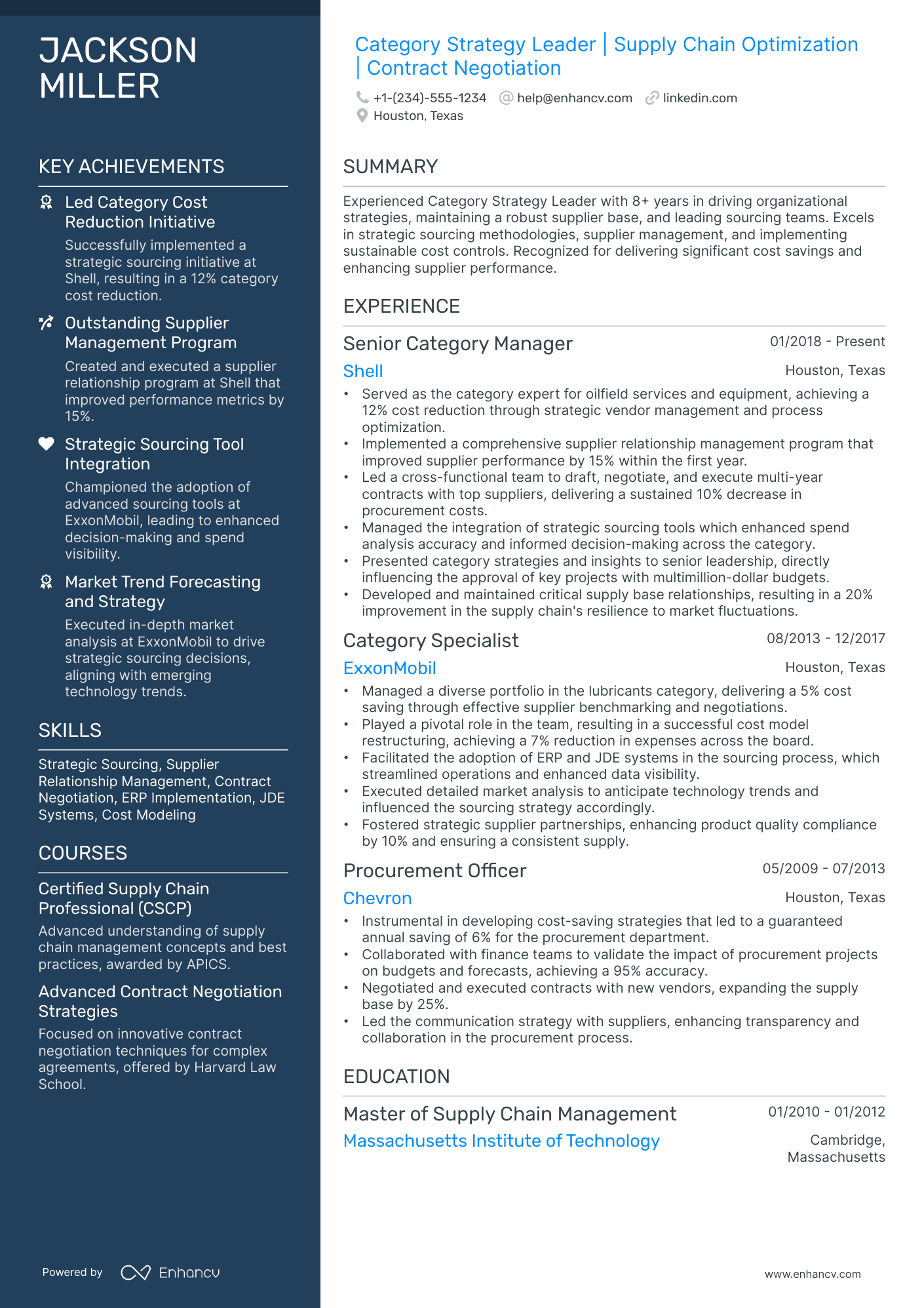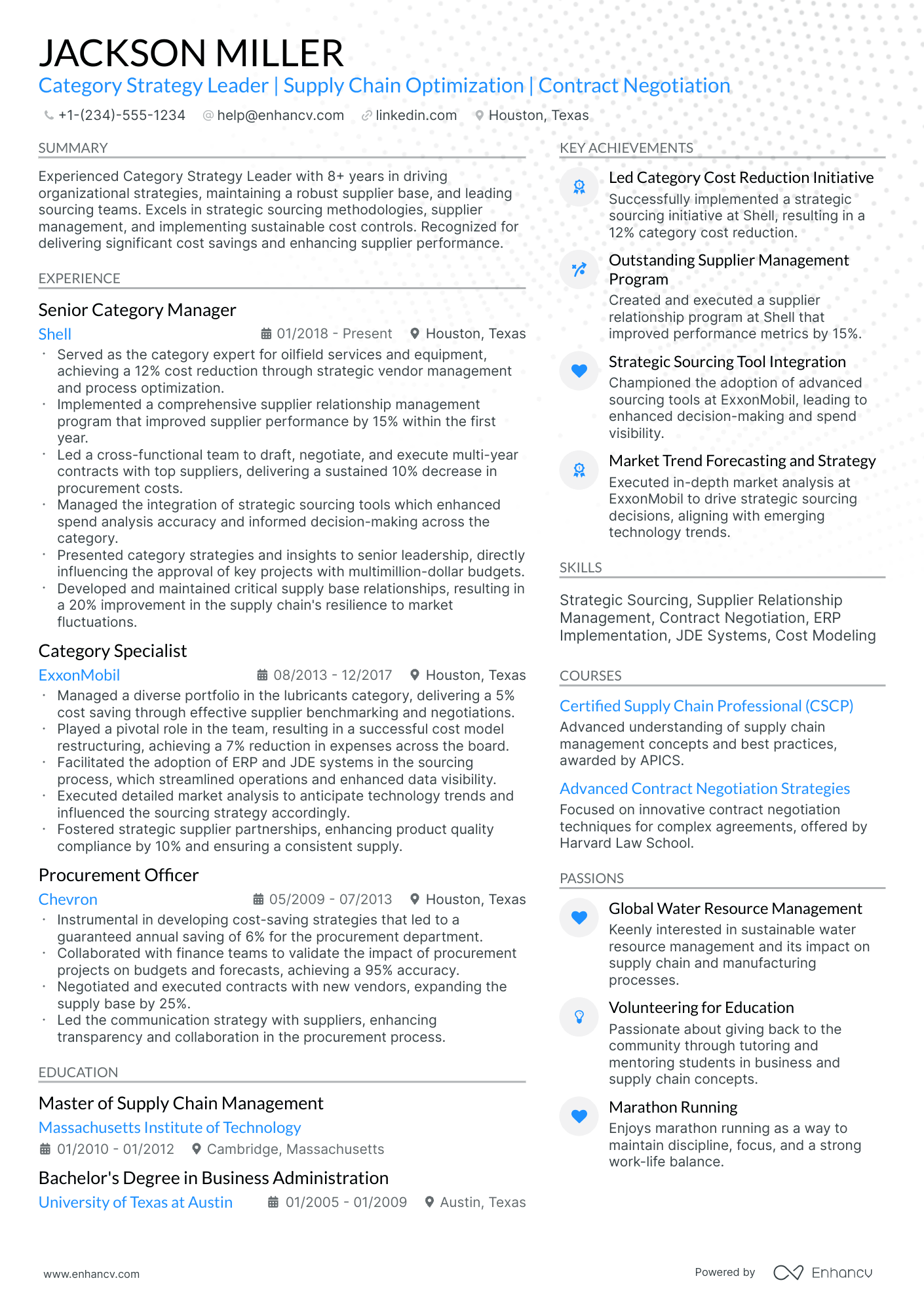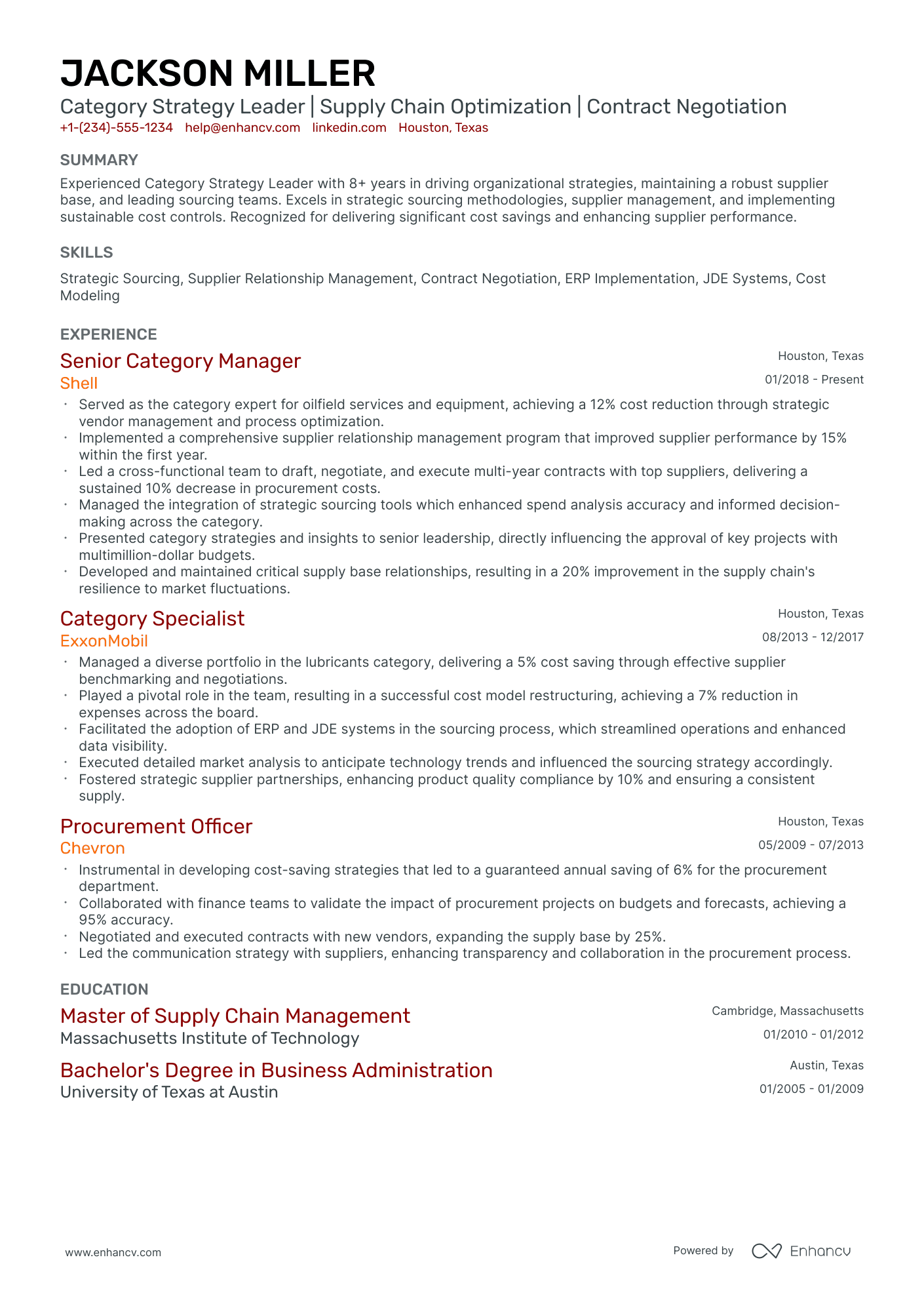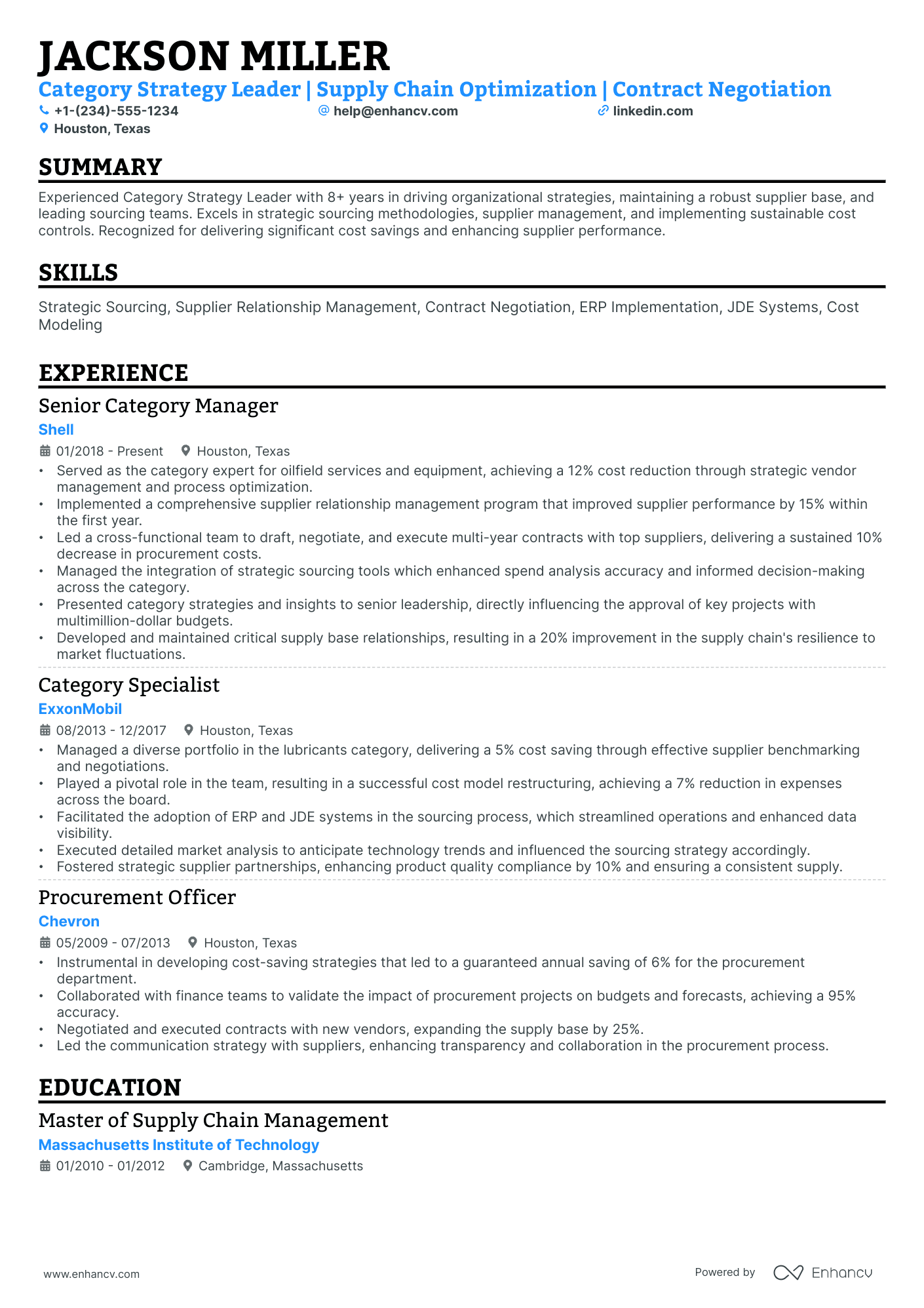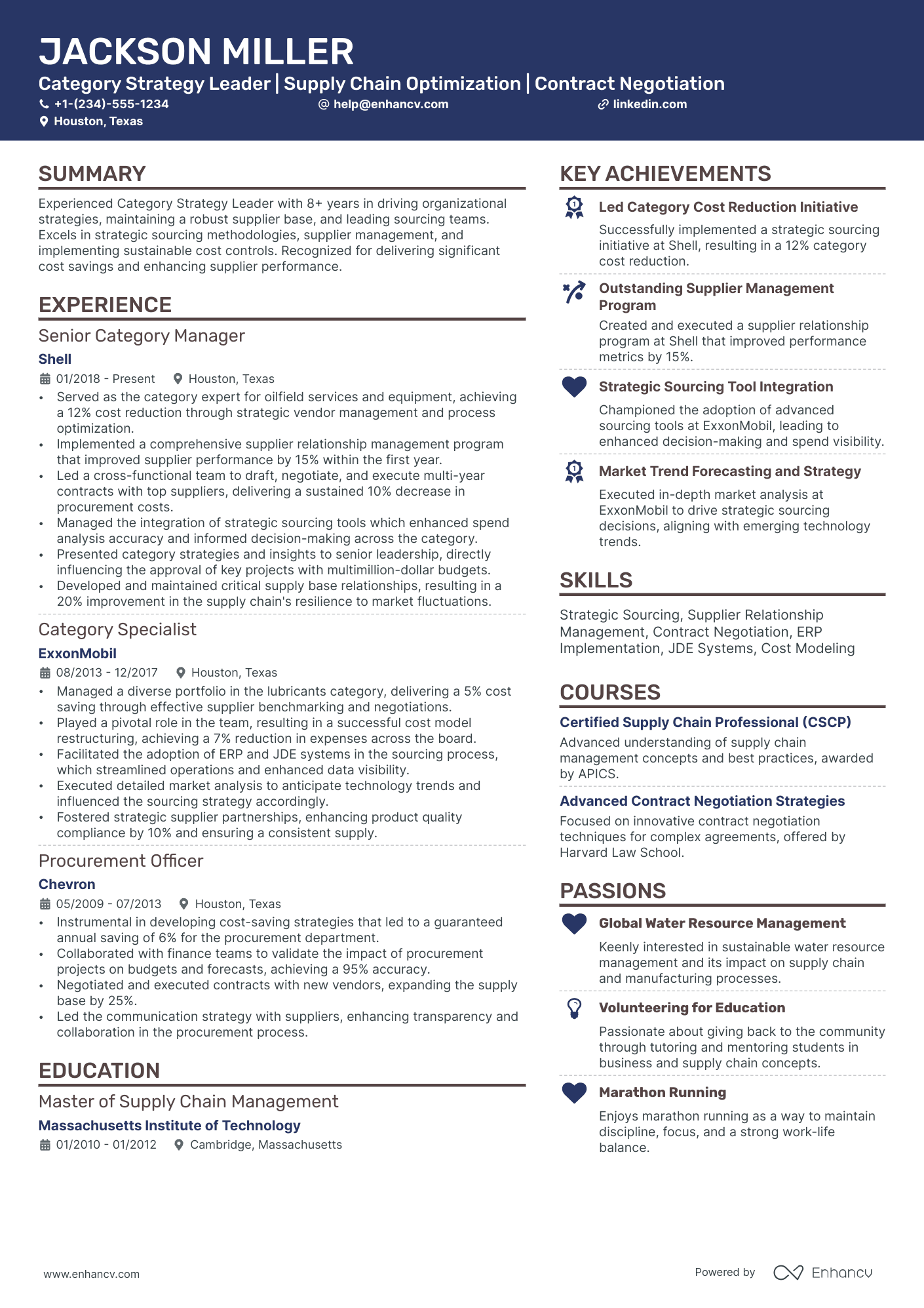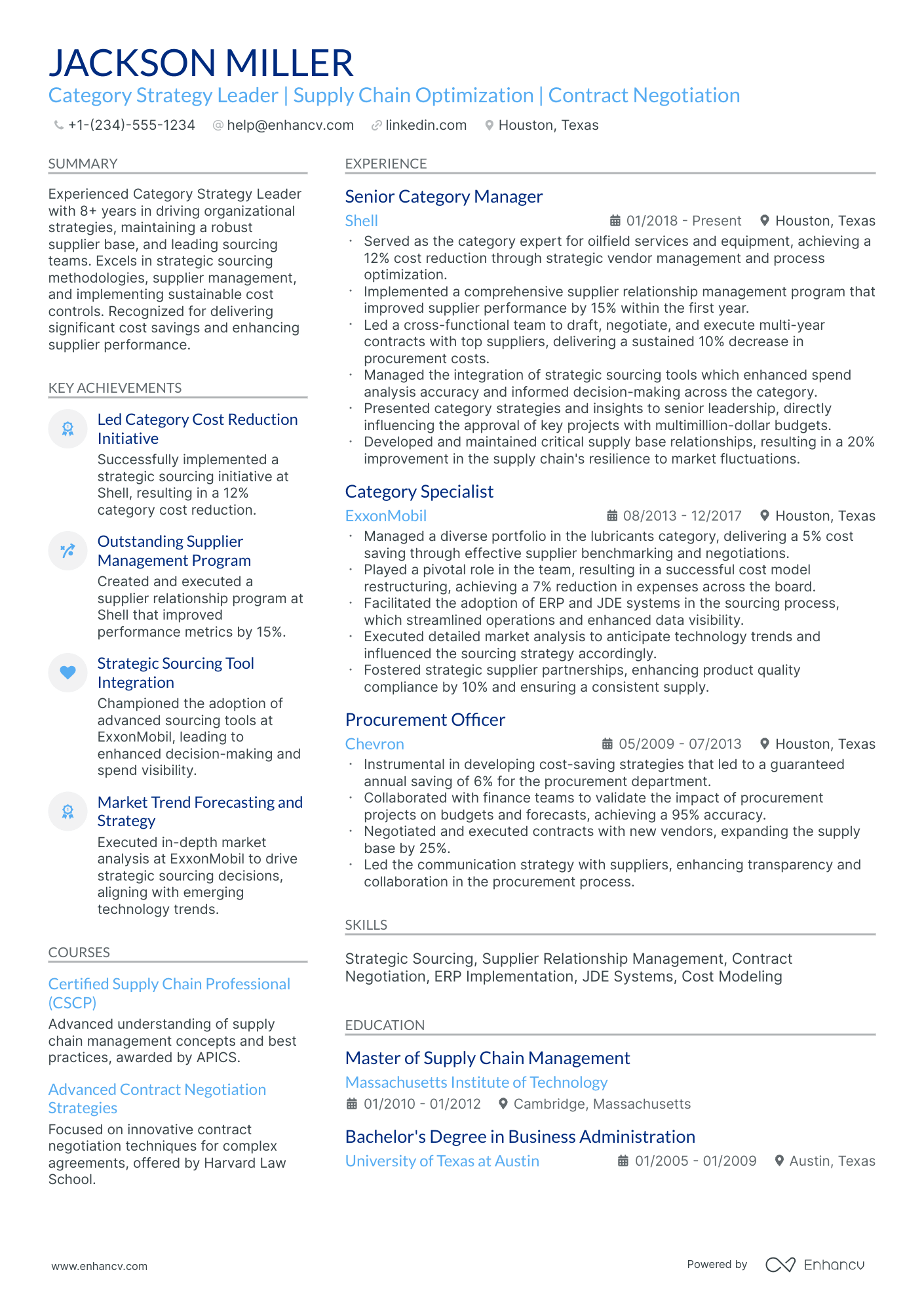As a commodity manager, articulating your ability to navigate volatile markets and negotiate favorable terms can be a significant resume challenge. Our guide provides expert advice on how to effectively showcase these complex skills, ensuring your resume stands out to potential employers.
- Format your commodity manager resume to ensure that it balances professionalism with creativity, and follows the best practices.
- Match the commodity manager job requirements by including industry keywords on your resume.
- Use various resume sections to showcase your skills and achievements to answer why you're the best candidate for the commodity manager role.
Take inspiration from leading commodity manager resume examples to learn how to tailor your experience.
- Sourcing Manager Resume Example
- Shift Manager Resume Example
- Solution Manager Resume Example
- Revenue Manager Resume Example
- Innovation Manager Resume Example
- Business Development Consultant Resume Example
- Business Operations Manager Resume Example
- Demand Planning Manager Resume Example
- Business Project Manager Resume Example
- Business Owner Resume Example
Designing your commodity manager resume format to catch recruiters' eyes
Your commodity manager resume will be assessed on a couple of criteria, one of which is the actual presentation.
Is your resume legible and organized? Does it follow a smooth flow?
Or have you presented recruiters with a chaotic document that includes everything you've ever done in your career?
Unless specified otherwise, there are four best practices to help maintain your resume format consistency.
- The top one third of your commodity manager resume should definitely include a header, so that recruiters can easily contact you and scan your professional portfolio (or LinkedIn profile).
- Within the experience section, list your most recent (and relevant) role first, followed up with the rest of your career history in a reverse-chronological resume format .
- Always submit your resume as a PDF file to sustain its layout. There are some rare exceptions where companies may ask you to forward your resume in Word or another format.
- If you are applying for a more senior role and have over a decade of applicable work experience (that will impress recruiters), then your commodity manager resume can be two pages long. Otherwise, your resume shouldn't be longer than a single page.
Think about the location of your application – Canadian resumes, for instance, might follow a different structure.
Upload & Check Your Resume
Drop your resume here or choose a file. PDF & DOCX only. Max 2MB file size.
PRO TIP
Highlight any significant extracurricular activities that demonstrate valuable skills or leadership.
Ensure your commodity manager resume stands out with these mandatory sections:
- Header - the section recruiters look to find your contact details, portfolio, and potentially, your current role
- Summary or objective - where your achievements could meet your career goals
- Experience - showcasing you have the technical (and personal) know-how for the role
- Skills - further highlighting capabilities that matter most to the commodity manager advert and your application
- Certifications/Education - staying up-to-date with industry trends
What recruiters want to see on your resume:
- Proven experience in commodity strategy development and execution
- Demonstrated ability to manage supplier relations and negotiate contracts
- Strong understanding of global market trends related to the specific commodities managed
- Experience with supply chain risk management and mitigation techniques
- Proficiency in cost analysis and savings reporting within commodity purchasing
Defining your professional expertise in your commodity manager resume work experience section
The work experience section, often the most detailed part of your resume, is where you discuss your past roles and achievements. To effectively list your experience, consider these four key tips:
- Align your expertise with the job requirements. It's vital to integrate keywords matching the job criteria to pass initial assessments;
- Show, don’t just tell. Quantify your responsibilities by stating your actual achievements in previous roles;
- Include measurable metrics. For instance, how did your performance impact the annual ROI?
- Highlight crucial industry skills. Mention both technological knowledge and interpersonal skills in this section.
These guidelines will help you craft an impressive commodity manager resume work experience section that is bound to catch recruiters' attention.
- Spearheaded supplier diversification strategy, which improved product sourcing from 10 different countries to mitigate risks and ensure supply chain resilience.
- Negotiated multi-year contracts with key suppliers that led to a sustained 12% cost reduction on raw material procurement.
- Implemented a commodity tracking system that improved real-time pricing analysis, driving more informed purchasing decisions and a 15% increase in overall profit margins.
- Managed a commodity portfolio of over $250 million, optimizing the supply chain through strategic sourcing and cost-saving initiatives.
- Developed and executed a risk management program that reduced price volatility exposure by 30%, stabilizing operational costs.
- Collaborated with cross-functional teams to launch a new product line, integrating sustainable materials that captured 10% market share within the first year.
- Oversaw a supplier consolidation project that enhanced operational efficiencies, leading to a 20% decrease in sourcing time.
- Initiated a supplier performance scorecard that improved supplier accountability and on-time delivery by 25%.
- Directed the procurement of raw materials for key accounts, fostering relationships that increased customer loyalty and repeat business by 40%.
- Reduced annual shipping and logistics costs by 18% through the renegotiation of freight contracts and the optimization of routing schedules.
- Championed the use of predictive analytics for commodity pricing, which enhanced the timing of purchases and inventory levels.
- Facilitated cross-departmental workshops to align procurement strategies with organizational sustainability goals, leading to a 12% reduction in carbon footprint.
- Negotiated and established a breakthrough joint venture with a local commodity supplier, resulting in a cost savings of $3M.
- Pioneered a supplier engagement program that led to performance improvements and stronger partnerships with top-performing suppliers.
- Implemented an innovative inventory management system that minimized waste and reduced excess stock levels by 22%.
- Executed a strategic procurement plan that supported new product development, accelerating the time-to-market by six months.
- Enhanced commodity forecasting accuracy by 35% through advanced data analytics, improving planning and reducing stock-outs.
- Founded a commodity-specific task force that identified and mitigated supply chain risks associated with geopolitical uncertainties.
- Led a cross-continental project team in the implementation of a global sourcing initiative that expanded the supplier base by 50%.
- Developed a closed-loop feedback system that captured commodity performance data, enhancing future purchasing strategies and supplier negotiations.
- Effected a commodity hedging program that secured advantageous pricing and locked in cost savings of 8% annually.
- Orchestrated a complete revamp of the commodity category strategy which led to annual savings of $5 million through value engineering.
- Implemented an e-procurement system that streamlined bidding and order processes, reducing procurement cycle times by 30%.
- Collaborated with R&D to source innovative materials that reduced production costs by 20%, while maintaining product quality standards.
- Secured long-term partnerships with critical suppliers, ensuring the uninterrupted flow of essential commodities in a fluctuating market.
- Initiated a corporate social responsibility program with suppliers, fostering an ethical supply chain and enhancing brand reputation.
- Drove a company-wide initiative for commodity standardization, resulting in simplified operations and a 15% cost saving in procurement expenditures.
- Optimized the total cost of ownership models for key commodities, aligning them with organizational financial targets and achieving a 10% cost-efficiency improvement.
- Engaged in high-level negotiations for critical supply agreements that boosted the company’s market position through advantageous pricing and terms.
- Developed and executed a supplier relationship management strategy that elevated supplier performance and fostered innovation partnerships.
The following content includes information from "O*NET OnLine" by the U.S. Department of Labor, Employment and Training Administration (USDOL/ETA). Used under the CC BY 4.0 license. The data represents the top responsibilities present on the task lists for commodity manager professionals.
Top Responsibilities for Commodity Manager:
- Develop and implement purchasing and contract management instructions, policies, and procedures.
- Locate vendors of materials, equipment or supplies, and interview them to determine product availability and terms of sales.
- Prepare bid awards requiring board approval.
- Direct and coordinate activities of personnel engaged in buying, selling, and distributing materials, equipment, machinery, and supplies.
- Review purchase order claims and contracts for conformance to company policy.
- Review, evaluate, and approve specifications for issuing and awarding bids.
- Administer online purchasing systems.
- Prepare and process requisitions and purchase orders for supplies and equipment.
- Interview and hire staff, and oversee staff training.
- Develop cost reduction strategies and savings plans.
Quantifying impact on your resume
- Include the percentage reduction achieved in material costs through strategic sourcing and negotiation with suppliers, demonstrating cost efficiency.
- List the monetary value of savings generated for the company by implementing process improvements and cost-saving initiatives, showcasing financial acumen.
- Quantify the reduction in supplier lead times as a result of your supply chain optimization efforts, highlighting improved efficiency.
- Document the volume of commodities managed in terms of units or dollar value to reflect the scale of responsibilities handled.
- State the number of supplier contracts negotiated and managed, indicating experience with vendor relations and contract administration.
- Describe any increase in inventory turns through your inventory management strategies, showing enhanced asset utilization.
- Mention the percentage of improved delivery time compliance achieved by optimizing supply chain logistics, underlining customer satisfaction.
- Report on the number of cross-functional teams led or collaborated with for sourcing projects, illustrating leadership and teamwork skills.
Action verbs for your commodity manager resume
Writing your commodity manager experience section without any real-world experience
Professionals, lacking experience, here's how to kick-start your commodity manager career:
- Substitute experience with relevant knowledge and skills, vital for the commodity manager role
- Highlight any relevant certifications and education - to showcase that you have the relevant technical training for the job
- Definitely include a professional portfolio of your work so far that could include university projects or ones you've done in your free time
- Have a big focus on your transferable skills to answer what further value you'd bring about as a candidate for the commodity manager job
- Include an objective to highlight how you see your professional growth, as part of the company
Recommended reads:
PRO TIP
If you're in the process of obtaining your certificate or degree, list the expected date you're supposed to graduate or be certified.
The right balance between hard skills and soft skills for your commodity manager resume
Wondering what the perfect commodity manager resume looks like? The candidate's profile meets job requirements by balancing both hard skills and soft skills across their resume.
- Hard skills are all the technologies you're apt at using . Prove you have the right technical background by listing key industry hardware/software in your commodity manager resume skills section and noteworthy certifications.
- Soft skills are both your personal, mindset, communication, analytical, and problem-solving talents . Use your commodity manager resume achievements section to show how you've used a particular soft skill to reach a tangible outcome.
When writing about your unique skill set, always make sure to refer back to the job advert to see what are the key requirements. This ensures you've tailored your resume so that it matches closer to what the ideal candidate profile is.
Top skills for your commodity manager resume:
Supply Chain Management Software
ERP Systems (e.g., SAP, Oracle)
Data Analysis Tools (e.g., Excel, Tableau)
Contract Management Software
Market Research Tools
Inventory Management Systems
Cost Analysis Tools
Supplier Relationship Management (SRM) Software
E-Procurement Systems
Forecasting and Demand Planning Tools
Negotiation
Analytical Thinking
Communication
Problem Solving
Strategic Planning
Team Collaboration
Decision Making
Adaptability
Time Management
Interpersonal Skills
Next, you will find information on the top technologies for commodity manager professonals from "O*NET OnLine" by the U.S. Department of Labor, Employment and Training Administration (USDOL/ETA). Used under the CC BY 4.0 license.
Top technologies for Commodity Manager’s resume:
- Microsoft Dynamics
- Oracle PeopleSoft
- Microsoft PowerPoint
- Purchasing software
- SAP Ariba
PRO TIP
Showcase any ongoing or recent educational efforts to stay updated in your field.
What are the best certificates to add to your commodity manager resume + how to curate your education section
The education and certification resume sections are the underdogs of your commodity manager resume.
They showcase to recruiters that you've invested plenty of time to gain valuable and specific know-how, vital for growth.
As far as the resume education section is concerned:
- Detail only advanced education, specifying the institution and timeframe.
- Indicate your forthcoming graduation date if you're in the midst of your studies.
- Consider omitting degrees that don't align with the job's requirements.
- Offer a description of your academic journey if it underscores your notable achievements.
When curating your degrees and certificates on your commodity manager resume:
- Select only accreditation that matters to the role
- Niche knowledge that could help you stand out as a candidate (as is within the past few years), should be listed towards the top of your resume
- Include any pertinent data for credibility (e.g. institute name, graduation dates, etc.)
- Irrelevant degrees and certifications shouldn't make it on your resume. Those include your high school diploma and any specializations that have nothing to do with the technical or soft skills that are required for the job
As a final note, if you feel tempted to exclude your education or certification from your resume, don't.
These two sections could help you have a better competitive edge over other candidates - hinting that your professional journey in the industry may be for a longer period of time.
Recruiters find all of these commodity manager credentials impressive:
The top 5 certifications for your commodity manager resume:
- Certified Purchasing Manager (CPM) - Institute for Supply Management (ISM)
- Certified Professional in Supply Management (CPSM) - Institute for Supply Management (ISM)
- Certified Supply Chain Professional (CSCP) - Association for Supply Chain Management (ASCM)
- Certified in Production and Inventory Management (CPIM) - Association for Supply Chain Management (ASCM)
- Chartered Institute of Procurement & Supply Diploma (CIPS) - Chartered Institute of Procurement & Supply (CIPS)
The content below includes information from "O*NET OnLine" by the U.S. Department of Labor, Employment and Training Administration (USDOL/ETA). Used under the CC BY 4.0 license. The data represents the top associations for commodity manager professionals.
Top US associations for a Commodity Manager professional
- Association for Supply Chain Management
- American Purchasing Society
- Institute for Supply Management
- National Association of State Procurement Officials
- NIGP: The Institute for Public Procurement
PRO TIP
Listing your relevant degrees or certificates on your commodity manager resume is a win-win situation. Not only does it hint at your technical capabilities in the industry, but an array of soft skills, like perseverance, adaptability, and motivation.
Recommended reads:
Professional summary or objective for your commodity manager resume
commodity manager candidates sometimes get confused between the difference of a resume summary and a resume objective.
Which one should you be using?
Remember that the:
- Resume objective has more to do with your dreams and goals for your career. Within it, you have the opportunity to showcase to recruiters why your application is an important one and, at the same time, help them imagine what your impact on the role, team, and company would be.
- Resume summary should recount key achievements, tailored for the role, through your career. Allowing recruiters to quickly scan and understand the breadth of your commodity manager expertise.
The resume objectives are always an excellent choice for candidates starting off their career, while the resume summary is more fitting for experienced candidates.
No matter if you chose a summary or objective, get some extra inspiration from real-world professional commodity manager resumes:
Resume summaries for a commodity manager job
- With a decade of expertise in the agricultural commodities sector, this seasoned professional drove a 20% cost reduction through strategic sourcing and risk management. Known for expertly balancing quality and cost while navigating complex international markets, they possess robust analytical and negotiation skills that have consistently enhanced supply chain efficiencies.
- Transitioned from financial analysis to commodity management, bringing 7 years of market trend analysis and forecasting experience. This candidate has a proven track record in data-driven decision making and has applied these skills to successfully mitigate risks and secure advantageous contracts in the metals industry.
- Armed with a powerful blend of 8 years in logistics and international trade law expertise, this candidate's switch to commodity management is bolstered by their knack for legal compliance and cost-effective supply chain solutions. They have achieved a 15% reduction in logistics costs by renegotiating carrier contracts at a previous role.
- A dynamic professional with 5 years of experience in the technology sector, with a focus on hardware procurement and supply chain optimization. Implementing innovative cost-saving strategies and fostering robust vendor relationships, they achieved a track record of securing high-quality materials within tight deadlines and budget constraints.
- Eager to bring fresh perspectives from a 3-year tenure in sales management to the challenging world of commodity management. This candidate is equipped with persuasive communication skills and a deep understanding of market dynamics, which are ripe for application in developing strategic procurement initiatives and stakeholder management.
- Highly motivated to transition into commodity management, leveraging strong analytical skills from a 4-year background in business intelligence. Enthusiastic to apply an aptitude for data analysis, trend spotting, and market research to contribute to informed purchasing decisions and resource optimization in the manufacturing sector.
Average salary info by state in the US for commodity manager professionals
Local salary info for Commodity Manager.” Source: My Next Move, National Center for O*NET Development. Accessed 10/15/2024
| State | Average Salary (in USD) |
|---|---|
| US National Average | $136,380 |
| California (CA) | $153,510 |
| Texas (TX) | $128,960 |
| Florida (FL) | $131,740 |
| New York (NY) | $165,930 |
| Pennsylvania (PA) | $134,010 |
| Illinois (IL) | $136,930 |
| Ohio (OH) | $128,500 |
| Georgia (GA) | $131,670 |
| North Carolina (NC) | $129,140 |
| Michigan (MI) | $134,970 |
Other relevant sections for your commodity manager resume
Apart from the standard commodity manager resume sections listed in this guide, you have the opportunity to get creative with building your profile. Select additional resume sections that you deem align with the role, department, or company culture. Good choices for your commodity manager resume include:
- Language skills - always ensure that you have qualified each language you speak according to relevant frameworks;
- Hobbies - you could share more about your favorite books, how you spend your time, etc. ;
- Volunteering - to highlight the causes you care about;
- Awards - for your most prominent commodity manager professional accolades and achievements.
Make sure that these sections don't take too much away from your experience, but instead build up your commodity manager professional profile.
Key takeaways
- The layout of your resume should take into consideration your professional background while integrating vital sections and design elements;
- Highlight your most pertinent achievements for the role all through different sections;
- Be very specific when selecting your certifications, hard skills, and soft skills to showcase the best of your talents;
- Include within the top one-third of your commodity manager resume a header and summary to help recruiters understand your experience and allocate your contact details. A skills box is optional, but it will help you align your expertise with the role;
- Detail the full extent of your professional experience with specific bullets that focus on tasks, actions, and outcomes.
